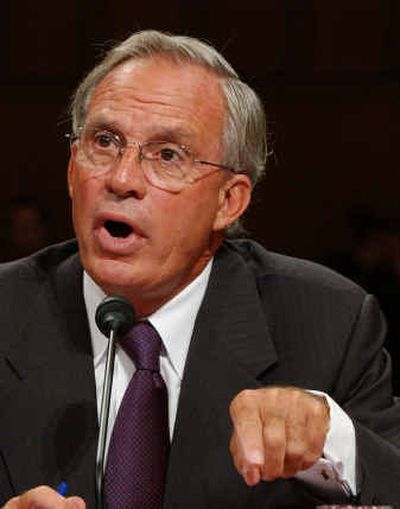Nominee for CIA chief faces panel

WASHINGTON – President Bush’s nominee to head the CIA promised Tuesday to shed his political past and provide precise, objective and independent intelligence to the president and Congress. But after a 4 1/2 -hour confirmation hearing, some Democrats on the Senate Intelligence Committee were not convinced.
“I have made a commitment to nonpartisanship,” retiring Rep. Porter Goss, R-Fla., told the panel. He conceded that during his 16 years in Congress, he may “at times” have engaged in debate with too much vigor.
“Rest assured, however, I understand completely the difference in obligations the position of (director of central intelligence) carries with it and that which the role of a congressman carries,” said Goss, who formerly chaired the House Intelligence Committee.
Goss’ demeanor rankled some Democrats. He said his record speaks for itself on a number of tough issues, including his initial opposition to the Sept. 11 commission and his positions on intelligence spending in the 1990s. Goss and the Democrats have each blamed the other for deep budget cuts.
Sen. Richard Durbin, D-Ill., accused Goss of dismissing many of the questions from senators.
“Whoever briefed you for this hearing and said that when you get in a tight spot over something you have said or done, keep repeating ‘the record is the record,’ did you no great service,” Durbin said.
After the hearing, Sen. Dianne Feinstein, D-Calif., said she wants to know which Goss she will be asked to confirm: the “fair, reasoned, knowledgeable” chairman she watched lead a joint congressional investigation into the Sept. 11, 2001, attacks, or the partisan who has since been making “highly charged” comments on behalf of the Bush administration.
More than half the panel’s Democrats said they were waiting until next week to say whether they will support Goss’ confirmation. No one so far has promised publicly to vote against him. Majority Leader Bill Frist, R-Tenn., has indicated he wants the Senate to vote on the nomination as soon as next week.
If confirmed, Goss would take over the agency just months after the CIA’s last director, George Tenet, shocked some on the Sept. 11 commission by saying it would take five years to install the kind of clandestine service needed to deal with international terrorism. Tenet blamed the situation on tight budgets after the Cold War.
Goss, however, said Tuesday it would take more than five years to train and place all the clandestine operatives the CIA needs. “I don’t believe five is enough,” Goss said. “It’s a long build-out, a long haul. It’s been started.”
In his testimony, Goss also outlined a series of commonly cited priorities for the U.S. intelligence community. They included improving human intelligence and analytic capabilities, expanding intelligence-sharing with state and local law enforcement agencies, and enhancing foreign language capabilities.
A former Army intelligence and CIA clandestine officer, Goss would assume at a tumultuous time the helm of the CIA and the dual role as head of the 14 other agencies in the U.S. intelligence community.